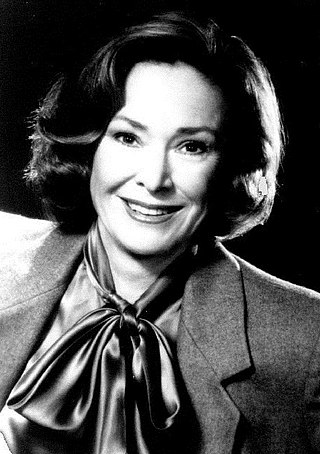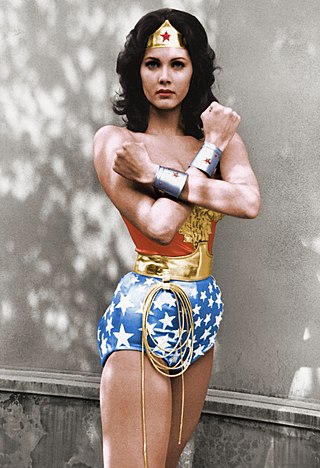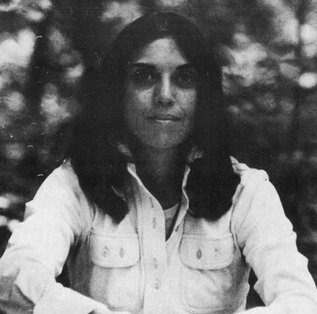Related Research Articles

Gloria Marie Steinem is an American journalist and social-political activist who emerged as a nationally recognized leader of second-wave feminism in the United States in the late 1960s and early 1970s.
WNET, branded on-air as "Thirteen", is a primary PBS member television station licensed to Newark, New Jersey, United States, serving the New York City area. Owned by The WNET Group, it is a sister station to the area's secondary PBS member, Garden City, New York–licensed WLIW, and two class A stations: WMBQ-CD, and WNDT-CD. The WNET Group also operates New Jersey's PBS state network NJ PBS, and the website NJ Spotlight through an outsourcing agreement.

Bella Savitzky Abzug, nicknamed "Battling Bella", was an American lawyer, politician, social activist, and a leader in the women's movement. In 1971, Abzug joined other leading feminists such as Gloria Steinem, Shirley Chisholm, and Betty Friedan to found the National Women's Political Caucus. She was a leading figure in what came to be known as eco-feminism.

Ms. is an American feminist magazine co-founded in 1971 by journalist and social/political activist Gloria Steinem. It was the first national American feminist magazine. The original editors were Letty Cottin Pogrebin, Mary Thom, Patricia Carbine, Joanne Edgar, Nina Finkelstein, Mary Peacock, Margaret Sloan-Hunter, and Gloria Steinem. Beginning as a one-off insert in New York magazine in 1971, the first stand-alone issue of Ms. appeared in January 1972, with funding from New York editor Clay Felker. It was intended to appeal to a wide audience and featured articles about a variety of issues related to women and feminism. From July 1972 until 1987, it was published on a monthly basis. It now publishes quarterly.

Joan Ganz Cooney is an American television writer and producer. She is one of the founders of Sesame Workshop, the organization famous for the creation of the children's television show Sesame Street, which was also co-created by her. Cooney grew up in Phoenix and earned a Bachelor of Arts in education from the University of Arizona in 1951. After working for the State Department in Washington, D.C., and as a journalist in Phoenix, she worked as a publicist for television and production companies in New York City. In 1961, she became interested in working for educational television, and became a documentary producer for New York's first educational TV station WNET. Many of the programs she produced won local Emmys.

Margaret Sloan-Hunter was a Black feminist, lesbian, civil rights advocate, and one of the early editors of Ms. magazine.

David William Huddleston was an American actor. An Emmy Award nominee, Huddleston had a prolific television career, and appeared in many films, including Rio Lobo, Blazing Saddles, Crime Busters, Santa Claus: The Movie, and The Big Lebowski.
Great Performances is a television anthology series dedicated to the performing arts; the banner has been used to televise theatrical performances such as plays, musicals, opera, ballet, concerts, as well as occasional documentaries. It is produced by the PBS member station WNET in New York City.
The National Black Feminist Organization (NBFO) was founded in 1973. The group worked to address the unique issues affecting black women in America. Founding members included Florynce Kennedy, Michele Wallace, Faith Ringgold, Doris Wright and Margaret Sloan-Hunter. They borrowed the office of the New York City chapter of the National Organization for Women. According to Wallace, a contributing author to the anthology All the Women Are White, All the Blacks Are Men, But Some Of Us Are Brave: Black Women's Studies, Wright "called meeting to discuss Black women and their relationship to the Feminist Movement."
Nudity in American television is a controversial topic. Aside from a few exceptions, nudity in the United States has traditionally not been shown on terrestrial television. On the other hand, cable television has been much less constrained as far as nudity is concerned.

Wonder Woman is a character created for comic books in 1941, the medium in which she is still most prominently found to this day. As befitting an icon of her status, she has made appearances in other forms of media and has been referenced and meta-referenced beyond the scope of traditional superhero entertainment. For several years in the 1950s, the only three superheroes to have their own comic book were Superman, Batman, and Wonder Woman.

Florynce Rae Kennedy was an American lawyer, radical feminist, civil rights advocate, lecturer, and activist.
Muriel Fox is an American public relations executive and feminist activist.
Lin Bolen was an American television executive and producer. She was most noted for her role at NBC daytime television programming as the first female vice president of a TV network, a position she held from 1972 until 1976. In this role, Bolen was responsible for commissioning the long-running game show Wheel of Fortune and is credited with bringing successful long form to network soap operas. Bolen was mentioned in Who's Who in America as a trailblazer for women in television.

Makers: Women Who Make America is a 2013 documentary film about the struggle for women's equality in the United States during the last five decades of the 20th century. The film was narrated by Meryl Streep and distributed by the Public Broadcasting Service as a three-part, three-hour television documentary in February 2013. Makers features interviews with women from all social strata, from politicians like Hillary Clinton and television stars like Ellen DeGeneres and Oprah Winfrey, to flight attendants, coal miners and phone company workers.
Brenda Feigen is an American feminist activist, film producer, and attorney.

Joan Shigekawa is an American film and television producer, cultural grantmaker, and arts administrator. After a distinguished career as a senior executive at the Rockefeller Foundation, she joined the Obama Administration in 2009 as senior deputy chairman of the National Endowment for the Arts (NEA) and served as the agency's acting chairman from 2012-2014.
Irma May Kalish was an American television producer and screenwriter who held a pioneering role as a woman in the TV industry. Kalish produced and wrote for television programs, including Too Close for Comfort, All in the Family, The Facts of Life, Good Times, The Hogan Family, Maude, I Dream of Jeannie, F Troop and Family Affair. She is known for writing the episode of Maude where Maude gets an abortion.

Sandra Elkin was an American television talk show host. She was the producer and host of the pioneering PBS program Woman, a half-hour public affairs show focused on women's issues.
References
- 1 2 3 Liza Baskin. (31 January 2013). “When Ms. Had Its Own TV Show”. Ms. Magazine.
- 1 2 3 4 O’Connor, John. (22 October 1975). TV: ‘Woman Alive!’ New York Times.
- 1 2 3 4 5 6 7 8 9 Woman Alive! Collection, 1974-1977: A Finding Aid. MC 421. Schlesinger Library, Radcliffe Institute, Harvard University, Cambridge, Mass. Accessed May 18, 2020.
- ↑ “Feminini-TV”. (June, 1974). Texas Monthly.
- ↑ Sandra Hollin Flowers to Woman Alive, June 19, 1974, folder 3, National Black Feminist Organization Collection, Special Collections, University Library, University of Illinois at Chicago.